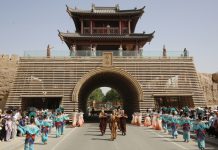BEIJING: China on Monday marked the 88th anniversary of the Lugou Bridge Incident, also known as the July 7 Incident of 1937, which marked the start of the entire nation’s resistance against Japanese aggression during World War II.
“Before dawn [that day], I was awakened by the sound as the 29th Army (of Chinese troops) clashed with the Japanese,” Zheng Fulai told China Media Group in an interview before he died in 2024.
“Clutching my mother’s dress, I fled to the northern end of Changxindian Town. There was a pine grove in the north of the town. There, covered by cloth were fallen soldiers of the 29th Army who had died defending the city and the bridge.”
Zheng, saddened by Chinese soldiers’ sacrifices, spent much of his life telling young people about the war, as he thought the younger generations should know about their country’s past and what its people went through.
Following the incident in southwest Beijing, then Peiping, the city was captured by the Japanese army on July 29, 1937. More than 10,000 civilians were killed or disappeared during the fall of the city.
The fall of Peiping City prompted the Chinese Kuomintang party and the Communist Party of China to cooperate in resisting against Japanese aggression, marking China’s whole-nation resistance against the Japanese invasion, which was widely recognized as the main battlefield against Japanese imperialism and fascism during World War II.
Official data shows that more than 35 million Chinese soldiers and civilians died during the war, accounting for nearly 8 percent of China’s total population in 1928.
The Exhibition Hall of Evidence of Crimes Committed by Unit 731 of the Japanese Imperial Army in Harbin City, northeast China’s Heilongjiang Province, released on Monday for the first time the complete video material of the oral testimony of Masakuni Kurumizawa, a former member of the Unit 731 – the notorious Japanese germ-warfare unit during World War II.
In the video, Kurumizawa openly confessed to crimes including human dissections, conducting human experiments and waging biological warfare.
Kurumizawa admitted that in order to cultivate more virulent bacteria, Unit 731 members had bacteria pass through the blood of living human bodies to achieve the desired effect.
“I dissected 300 human bodies, about one-third of which were preserved as specimens, while the rest were burned. When we performed the dissections, the bodies were still warm, and blood spurted out,” Kurumizawa said in the video.
Citing the testimony of Kiyoshi Kawashima, head of Division 4 of Unit 731 at the Khabarovsk War Crimes Trials, Jin Shicheng, deputy secretary general of Harbin Research Institute on History of Bacterial, Gas War of Japanese Invasion in China, said that between 1939 and 1945, 400 to 600 people were imprisoned each year for experiments.
Kurumizawa noted that due to Unit 731’s strict secrecy regulations, even his own family was unaware of his criminal activities. This secrecy was a major reason the unit’s crimes remained hidden after World War II.
Adding that only a few former Unit 731 members have come forward voluntarily decades after the war, Jin said Kurumizawa’s video offers crucial evidence and called on global peace forces to work together to further expose the atrocities of Unit 731. –The Daily Mail-CGTN news exchange item
Home CHINA-CPEC-BRI China marks 88 years since start of whole-nation resistance against Japanese aggression






